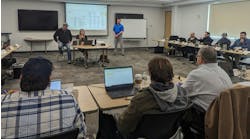If you are like most readers of Contractor, whether you own your own firm or are in executive management, chances are you’ve gotten there by working your way up from the field.
Pardon the headline parody of the more famous book title, but this is something I truly believe. By the time you’re 6 or 7 years old, you’ve basically chosen at what point along the circumference of the compass your life will follow.
By the time you’ve become self-aware of your individuality, you’ve already made choices about how you intend to learn the curriculum of life’s lessons. You’ve also decided how you will treat teachers and students who will become part of the school of your life.
A tiny private school of less than 60 students, Miss Shelly’s Private School in Raleigh, N.C., had the flexibility to treat all students as individuals, not numbers. There I was given a firm basis of potential achievement.
The first thing she taught me was that she was smarter than I was. In any given group of people, you will always find people who are smarter and dumber than you. Since people don’t go around with tattooed bar codes on their wrists that you can scan for their full bio (not yet, at least), never assume a lack or presence of intelligence from appearance alone.
Using the burgeoning self-awareness of the class, Miss Shelly taught us that intelligence is a spectrum of talent, abilities and motivations, not a narrowly defined wavelength of potential.
In the end, producing a correct solution to a problem is the best indicator of true intelligence. Potential, without the motivation to apply oneself to produce desired results, remains just that.
By illustrating the difference in abilities among us, she then taught us that we should always have a basic, decent, common respect for one another. None of us did perfect classroom work. Because we were imperfect little children, we were all equal in God’s eyes, and hers.
Miss Shelly taught me that you must master the fundamentals before you can master the esoteric. She let me learn advanced math skills — up to and including some high-school level algebra and even a few simple calculus problems — as soon as I could prove to her that I had actually learned the basics.
Once at a higher level, she brought me back to the fundamentals by having me occasionally tutor some students who were having problems in math. She increased my self-esteem while she nudged me down the path of never forgetting the fundamentals by making me deal with them on a daily basis.
During our playtime, she taught us that simply being a kid and having fun is what makes being a kid fun. The older we become, the more important it is to remember that until we pass on, we’re all still children in God’s eyes and that we should keep that child-like, but not childish, part of ourselves. It’s how we renew strength to face another day.
In our group projects, Miss Shelly taught us to begin all projects from the ground up, not the roof down. All projects, no matter how humble, must begin with a motivation that becomes a plan. The plan generates a timetable that drives the decision-making process on how to proceed during its execution. She made it clear that tangible results, not grandiose plans, are what matter most.
She taught me my earliest lesson in leadership by never appointing a leader for a class project. We learned early in life that in absence of an appointed hierarchy, a leadership structure would inevitably emerge from the initial chaos. One might as well be a leader.
But perhaps the most profound lesson she taught us all, in her results-oriented teaching style, is that while one should always focus on solving a problem, one doesn’t have to sacrifice any part of one’s self to achieve that goal.
By recognizing your own weaknesses and strengths, and learning to assess those qualities in others, you discover that acquiring knowledge becomes a matter of focus. A person has to pay attention to details, crossing the T’s and dotting the I’s, and that has become my core definition of being a professional project manager.

